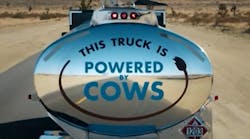Diesel and natural gas and propane and battery electric and hydrogen, oh my.
The ongoing transition to clean and sustainable freight transportation features a range of fuel options and some impressive technologies. But for trucking fleets accustomed to taking on a few evaluation units before committing to a nameplate or even to the latest model update, the significant differences between powertrain platforms pose new operational and maintenance challenges.
Cummins has taken a leading role in providing choices for truck engines, which means they also have to take a leading role in simplifying shop requirements.
See also: 2023 alternative-fuel engine outlook
"With the fuel agnostic platform that we have, how do you scale up the mechanics with the least possible effort, but also so that they get the best technology? We want to make sure that almost everybody is trained to be able to look at different fuels in different platforms," Puneet Jhawar, general manager for Cummins global spark ignited and fuel delivery system business, told FleetOwner. "So we're trying to commonize as many tools as possible—we want to be able to use the same tool to diagnose a diesel engine and natural gas and hydrogen. We also want to commonize as much as we can between the architecture of the engines as well."
On a more basic level, shop design has to take into account the different properties of the fuel types, Jhawar added as we spoke in the large garage where the cab of the Shell Starship 3.0 would soon be paired with the chassis, powered by the Cummins X15N natural gas engine.
"Natural gas and hydrogen, they have gaseous fuels, and they'll go up, versus diesel and gasoline, which typically fall down—so you need a venting mechanism," he said. "We are looking at the shops and trying to get the base capability for being able to service these alternative types."
The looming unknown variable in this transition—in planning for and investing in still-developing technologies—is the timeline: Just how quick will the adoption be?
"That's going to be a challenge that the industry will have to go through," Jhawar said.
The good news is that companies like Waste Management (No. 3 on the FleetOwner 500: Private) and UPS (No. 2 on the FleetOwner 500: For-Hire) are pioneering the path to multi-platform shops and operations, and Cummins is paying attention.
See also: Long-haul's journey to near-zero
Just to add to the complexity, he also pointed out that policymakers and regulators, from the federal level down to the local fire marshal, all will have a role in the transition.
So Cummins is developing a "playbook" with OEM partners to help fleets and service technicians understand their options.
"We want to let customers know how to do things and still be compliant, to make sure it's a safe environment to work in but gives us a similar experience to diesel [powertrains]," Jhawar said. "But diesel's had a head start for 100 years, so it's going to take time to catch up."
Dealer role
A week or so later, I had a chance to discuss this transition with Colter Souser, director of EV development for Rush Truck Centers, and he quickly noted that alternative fuels are nothing new for the large, nationwide dealership.
Indeed, Rush and Cummins are partners on a 50/50 joint venture, Cummins Clean Fuel Technologies, which develops natural gas powertrain systems, "so we have been getting our shops ready to be working on natural gas for a long time," Souser said, adding that natural gas is "near and dear" to Rush.
Speaking at FleetOwner's Commercial Electric Vehicle Infrastructure Conference (CEVIC), Souser suggested that hydrogen is going to have a lot of the "same requirements for building facilities." As for EVs, Rush is training technicians and educating customers on high-voltage tooling and techniques, he explained.
"So EVs are fairly new to Rush, but alternative fuels aren't. Rush as a dealer group has been one of the pioneers for renewable natural gas," Souser said. We're going to have an easier transition than most, but for the mom-and-pop dealerships—with one or two locations—it's not a small investment to go into this, even natural gas.
"Kind of the fallback is just to work on it outside—and that's not right. We are going into this making cognitive decisions about the future of trucks every time we're making upgrades or building new facilities."
And that long-term thinking, from equipment manufacturers, dealers, and fleets is going to be the difference between an expensive helter-skelter transition and a smooth and steady–but still not cheap—one.





